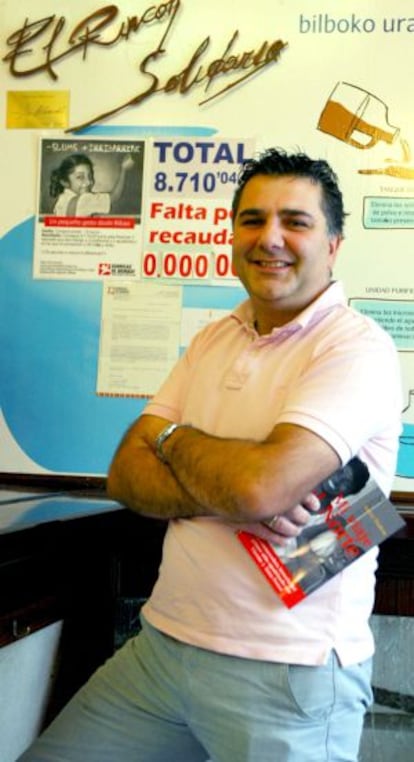The Basque barman following in the footsteps of Vicente Ferrer
Inspired by the philanthropist, Manuel Orozco has raised 150,000 euros for aid projects in India

Manuel Orozco is not your typical barman. In 2005, shortly after he returned from his first trip to India, he managed to persuade his employer, Miguel Muñoz, to let him use a corner of the bar to tell customers from the working-class Otxarkoaga neighborhood of Bilbao about the work of the Vicente Ferrer foundation. Since then he has raised 150,000 euros for the cause.
Orozco was inspired to get involved in charity work after watching a documentary about the work of Spanish philanthropist Vicente Ferrer - who died in 2009 - in southern India.
"We were struck by what we saw, and so when Vicente Ferrer came to speak in Bilbao in 2005, we decided that we needed to know more about his work," says Orozco, who is about to travel to Anantapur, in the southern Indian state of Andhra Pradesh for the sixth time to hand over 24,000 euros he has raised. The money will be used to set up a drinking water system. "There will be between 12 and 14 people travelling, so that we can show them how we invest the money we raise," he explains.
In 2007, a visit to Prague gave him the idea of raising money by inviting donors to contribute toward the cost of a brick. The 7,000 euros that brought in made it possible to build a school. "You can do a great deal with very little in India," he explains. "For two euros you can feed a child in India for an entire year." In fact, 3,000 euros of the money he has just raised will be used toward a nutrition plan for 1,480 children living in remote rural areas in desperate poverty in Andhra Pradesh.
Last week, Spanish state broadcaster TVE screened a biopic about the life of Vicente Ferrer, starring Imanol Arias, who also features in a media campaign to raise funds for the charity.
Ferrer was born in 1920 in Barcelona, and fought in the Spanish Civil War against General Franco's forces. He fled to France in 1939, but was sent back to Spain and imprisoned. After extended military service he began studying law, but in 1944 decided to become a Jesuit priest. He began working with rural communities in India in 1952, discouraging them from heading to the city to work, and providing them with funding to dig wells and buy seeds. After his work was publicized in the late 1960s, he was expelled by the Indian authorities, but was personally invited back by then-president, Indira Gandhi.
He left the Jesuits, and with his wife, British journalist Anne Perry, set up his project in Anantapur based on the system he called "linked brotherhood," whereby help is given to each family to dig their own well, with material and food for the duration of the work; when this is finished the family helps others in the same way.
Orozco has seen the film, but says the life of Ferrer is worthy of a major motion picture. "In the meantime, we'll continue doing what we can," he says.
Tu suscripción se está usando en otro dispositivo
¿Quieres añadir otro usuario a tu suscripción?
Si continúas leyendo en este dispositivo, no se podrá leer en el otro.
FlechaTu suscripción se está usando en otro dispositivo y solo puedes acceder a EL PAÍS desde un dispositivo a la vez.
Si quieres compartir tu cuenta, cambia tu suscripción a la modalidad Premium, así podrás añadir otro usuario. Cada uno accederá con su propia cuenta de email, lo que os permitirá personalizar vuestra experiencia en EL PAÍS.
¿Tienes una suscripción de empresa? Accede aquí para contratar más cuentas.
En el caso de no saber quién está usando tu cuenta, te recomendamos cambiar tu contraseña aquí.
Si decides continuar compartiendo tu cuenta, este mensaje se mostrará en tu dispositivo y en el de la otra persona que está usando tu cuenta de forma indefinida, afectando a tu experiencia de lectura. Puedes consultar aquí los términos y condiciones de la suscripción digital.








































